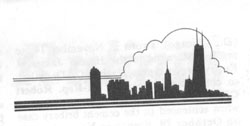

By CHARLES B. CLEVELAND
Chicago
Can Dr. Stein make the new medical examiner's office work in Cook County?
ROBERT J. STEIN is a nationally known doctor primarily because all of his patients are dead and, in a remark- ably large number of cases, he knows why. In his case, it isn't a matter of alarm; Dr. Stein is a forensic pathologist whose job it is to find out how and why a person died.
That could mean a potential murder, a questionable suicide, or perhaps a relatively routine examination to deter- mine the medical cause of death in cases where the person died without a doctor.
Replacing the coroner
In addition to his existing reputation,
Dr. Stein is currently making new
history. He is the first medical examiner
in Cook County history. Until now the
county has operated under the coroner
system (the rest of Illinois still does), and
it was filled with problems of patronage,
outmoded procedures and a horse-and-
buggy approach to jet age medical
puzzles.
Probably the most graphic change will be the end of routine inquests. Under the old system a sort of legal hearing was conducted by a deputy coroner and a six-man jury none of whom were doctors or trained investi- gators and the system was often helpless except for routine or obvious cases.
Learning for the living
Now deaths will be examined by a
trained pathologist backed up by teams
of specialists in various medical fields
and a group of expert investigators who
will go into more intensive studies where
questions of the identification of the
victim or the cause or reasons of death
go beyond medical limits.
One popular misconception is that murders are a major concern of the office. Actually these comprise 7 to 9 per cent of all death investigations. Auto accidents, deaths due to drug reactions and unattended deaths are far more common.
Why is it important to have a compe- tent investigation?
"It has been said many times," Dr. Stein replies, "that it is the living who learn from the dead. Our life span would not have been extended if we had not examined those who died. We're not going to spend $2 million a year just finding out why somebody died; the question is: What can the living learn from it?"
Dr. Stein cites many examples from his own experience. He had been called in to investigate a murder in which the accused had been involved in an earlier violent death. Why was this man, apparently mentally ill, not under treatment?
Preventing deaths
He also points out the large number
of deaths in hospitals which record that
the patient died in the recovery room.
His experience suggests many of those
patients probably died on the operating
table. If these cases were properly
investigated, similar deaths might be
prevented in the future.
There is also a group maybe 15 per cent where even a team of highly skilled pathologists is unable to deter- mine a cause of death. Many of them occur in athletic events, but the victim shows no sign of heart disease or other abnormalities. Perhaps, Dr. Stein theorizes, it is a reaction from the chemicals the body produces under stress maybe this process robs the heart of the necessary oxygen. If so, why, and what can be done about it?
These are some of the questions Dr. Stein hopes his staff can explore as part of the process of learning for the living "societal medicine" is the term he prefers to use.
Dr. Stein met his first challenge even before he took office; he was able to find a full staff of pathologists even though there is a national shortage. His national contacts over the years helped; also the challenge of a major urban center attracted many.
Changing system statewide
Dr. Stein sees this same appeal
extending to other Illinois areas; other
counties may ask professional help from
his staff when specific problems arise. He also hints that present pathologists
in private hospitals around the state
may become more active in assisting
coroners' offices now that Cook County
has adopted the new system of medical
examiner.
But it is also clear he will continue his role as a major leader in the effort persuade the General Assembly to change to a statewide medical exaiminer system. Some legal authorities believe it will take a statewide law to affect the changeover in all jurisdictions except those with home rule power (which no county outside Cook now has).
Dealing with politics
Dr. Stein regards this as a personal
challenge. How well he does his job as
Cook County's medical examiner will
probably turn out to be the key argument whether the system is adopted
statewide. There seems to be consensus
among professionals that he and his
staff have the scientific skills. The real
challenge may come in dealing with (or
avoiding) the politics of Chicago and
Cook County.
Dr. Stein indicates he may be ready for that too. If his office attempts to softpedal, for example, a police brutality case, "I ought to be booted out of office." If the pressures get too much Dr. Stein says, "I'm a licensed physician and I can always make a good living."
January 1977 / Illinois Issues / 30